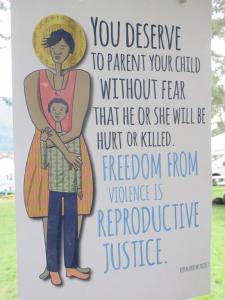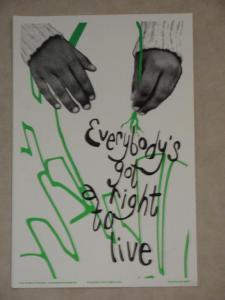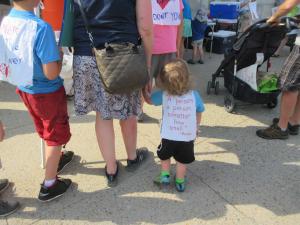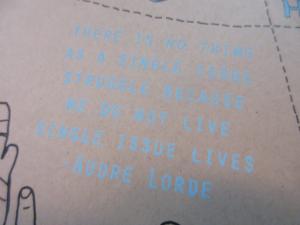This week I’ve been back home recuperating from a particularly overwhelming conference season packed into the past couple of months: two events at which I tabled for Consistent Life, two I attended out of my own personal interests, and a regional weekend workshop that happened to be on my way back home. All of these events drew

very different crowds, and within each one I had the paradoxical feeling of being both at home and somewhat out of place, in different ways. The interesting interactions and thought-provoking presentations I experienced are too many and varied for a single post, but across a few of them, a particular common thread emerged. From a few different angles, they could be said to revolve around the question: how is abortion connected to other human life and dignity issues? Which, to my mind, raises another question: why is abortion in particular so often disconnected, from either side?
Wild Goose Festival.
My booth partner remarked to someone that Consistent Life gets “a hard time fromall sides,” in the sense that we tend not to fit the usual political categories. This is often true (and for me, a badge of honor), yet I also sometimes find that simply moving in certain circles comes with the presumption of being a fully initiated insider. Navigating this colorful cast of characters in an intensive weekend with a folksy,

hippie-camp vibe, much as I connected with many of the dominant positions related to social justice and equity, I also got the feeling I didn’t quite check all the expected boxes. This was nowhere more apparent than in the workshop dedicated to “reproductive justice,” which seemed promisingly broad but ended up questioning whether working to eliminate economic, labor and gender injustices that drive abortion was even worth the effort. Fortunately, we did come to some agreement on the importance of opposing these injustices in the end. (I wrote a fuller description of this experience on the Consistent Life blog.)
Catholic Writers Guild.
Another promising, and indeed mostly helpful, presentation came at a conference full of Catholic authors, one of whom spoke on overcoming polarization. After making several good points about specific capacities of writers that can counteract polarizing techniques, she turned to the pro-life movement as an example of preserving unity in a way that sounded rather constraining, talking about people who have nothing in common but their desire that babies not be killed in the womb and hence the need to keep the focus specifically (solely?) on that. Did she mean to suggest that preserving pro-life unity requires remaining purely single-issue? When I asked her this afterward, she quickly clarified that what she meant to advocate was not disconnection but patience, i.e., not insisting that everyone have all the right connections made before we can work together on one shared concern. A fair point, and one that applies any number of ways. Although I was not officially representing Consistent Life in that venue, I pointed out that its work necessarily involves building bridges in multiple directions, both by joining forces on specific “issues” and by appealing to those we join forces with to apply their own pro-life principles more consistently. Otherwise, these principles cannot ultimately have much credibility.
Healthcare is a Human Right Collaborative.

On my way home from the writers’ conference I changed gears yet again, to a weekend workshop involving worker advocacy organizations from three states, including one I am a member of. Recognizing that I come to issues of labor justice from different sources than most there, I try to take certain quasi-revolutionary language generally in stride, although I found myself invoking Kingian redemptive personalism more than once. At one point I noticed one of the older women from my local group wearing a button that simply read, “GRR!” I asked her what it meant, and she told me it stood for “Grandmas for Reproductive Rights.” An awkward pause followed. As we continued talking and she realized I was pro-life, she hastened to disclaim that she would not have an abortion or encourage her children to do so, “but it’s a choice.” Talking about the need for life-affirming support, she seemed to fall back onto a kind of defeatism similar to that of the abortion advocates at Wild Goose: “but the support structures aren’t there.” Well, I said, then that’s the problem. She mentioned working in schools and seeing children suffering from neglect. When I asked if she could look at any of those children and say they’d be better off never having been born, she deflected, saying that they have been born and need support and care. Well, yes, exactly.
But it’s a choice: that’s where she would invariably land. Thinking afterward of a parallel that might resonate, I wondered how she would respond to an economically liberal defense of a business owner choosing to use unjust labor practices, easily made in the same terms: “it’s their choice.” But like abortion, it’s a choice that directly affects people’s lives.
Divided allies…
Back home, while I was still processing all of this, I got a call from a friend who was in town at a pro-life rally, where she reported being shouted down and “mansplained” and wanted some support. I wasn’t too at ease (nor was she, I gathered) with the connection to support for Supreme Court nominee Brett Kavanaugh, but maybe together we could send a broader, less pigeonhole-able message. So I threw on a t-shirt I had from Rehumanize International, grabbed a Consistent Life banner and box of buttons I had left over from conferences, and headed out.
I was startled to recognize a couple of people I knew from the same local workers’ organization mentioned above, and someone else I had previously stood beside at a local protest against police brutality. I wasn’t so naïve as to be completely surprised to find us falling on different sides here, but when you find common cause with someone and then suddenly see them staring at you from the other side of a divide, it’s jolting. It did open up some occasion for dialogue, and so I spent whatever local activist street cred I had previously acquired on the chance to explain that I was there not to support Kavanaugh but to add some consistent messaging, and that I was pro-life for the same

reasons I was with them on local healthcare and workers’ rights issues, bloated military spending, police killings, and the separation of immigrant families. We managed to have some decent, respectful conversations with a few people – who then went back to rejoin the full-throated chants proclaiming that pro-lifers are “racist, sexist, anti-gay” and “don’t care if women die.”
Like with activists of any stripe, we saw some tactical differences play out. When some of the counter-demonstrators formed a chain to block us from a crosswalk, one man carrying a rainbow flag insisted, over his friends’ objections, on letting us pass. A middle-aged Irish woman gently scolded a younger man for his harsh speech, telling him she was on his side and that wasn’t helping their cause. She too stopped to talk, most respectfully of all, asking me and my friend whether being pro-life included concern for born and unborn children being bombed overseas – to which our answer, naturally, was an unequivocal yes.
…and united opponents?

Exchanges like this make me wonder if those of us who favor more dialogical and solutions-oriented approaches to issues, as deeply as our own convictions run (mushy middle we most definitely are not), may have more in common with each other than with people on our own sides who are simply spoiling for a fight. There does seem to be something surprisingly close to broad agreement among a surprising variety of people I’ve talked to recently about – broadly speaking – structural work to be done.
There may be situations in which (nonviolent) confrontation is necessary, but perhaps it’s become the norm where it should be the exception. It’s harder to see each other’s humanity in a confrontation, to say nothing of connections between issues. By contrast, in each of the more collaborative events described above – despite areas of disagreement and disconnect – the people I encountered, both previously known and newly met, were not only friendly but in some cases modeled graciousness in ways that truly put me to shame. There is a lesson in this that hits close to home for me: every conference, every demonstration, every dialogue, every social action of any kind is a reminder to better live my convictions about universal human dignity, not just in the abstract but in the immediate – that is, in the maddeningly complex fellow humans who cross my path.












